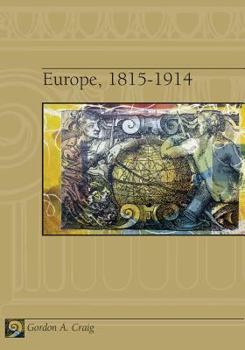Europe
Select Format
Select Condition 
Book Overview
A view of Europe during the years 1815 to 1914. This description may be from another edition of this product.
Format:Paperback
Language:English
ISBN:0030891949
ISBN13:9780030891946
Release Date:November 1997
Publisher:Houghton Mifflin
Length:502 Pages
Weight:1.95 lbs.
Dimensions:1.1" x 7.1" x 10.1"
Customer Reviews
2 ratings
History As Cecil Rhodes Would Have Written It
Published by Thriftbooks.com User , 18 years ago
Historians, like other people have perspectives. And when reading and evaluating the work of any historian, it is critical to understand the historian's perspective. With Gordon Alexander Craig, we may have the advantage of his informing us of his perspective within the corpus of this very text. Craig was a Rhodes scholar. On page 475 of "Europe 1815-1914", Craig is kind enough to share that the idea Rhodes had in setting up this scholarship was to promote the commonality of interests of Anglo-American and German cultures by providing advanced educational opportunities to high potential young men, particularly of America and Germany. So, we have here certainly, and we suspect in Craig's other works, history as Cecil Rhodes would have written it. What does this imply? The Catholic Church and Catholic cultures are portrayed as reactionary. Orthodoxy is described as medieval. Holy Russia is portrayed as the most sinister nation of the late 19th and early 20th century, when it was, in fact, the last great Christian monarchy. Knowing the greatness and beauty of Holy Russia, Craig's work in this area is almost literally painful to read. All that being said, this book is extremely well written. The narrative flows well. It is conclusive relative to the great events of the period from the fall of Napoleon to the outbreak of the Great War. In that sense, the work is quite useful and worhty of time and effort. However, in making this qualified recommendation, we must acknowledge that traditional Roman Catholics and Orthodox will tend to have a strong, negative reaction to many of the things the elitist author has to say.
Excellent followup to Durant
Published by Thriftbooks.com User , 24 years ago
Readers who enjoyed Will Durant's excellent Story of Civilization series will enjoy Craig. Durant finishes with Napoleon, so he and Craig overlap very slightly, but that's not really a problem. Craig is thorough -- and thoroughly readable.This history is limited to Europe; events elsewhere in the world are only discussed to the extent that they impact Europe. Since the 19th Century was Europe's great century, though, during which the continent essentially dominated the world, this turns out not to be much of a problem. And before studying the history of any other part of the 19th-Century world, one would want to have a solid understanding of European history anyway.This is of particular benefit to anyone who knows a lot about US history and who has been puzzled by the occasional European intrusions into it. (E.g. what was Maximillian doing in Mexico?)






